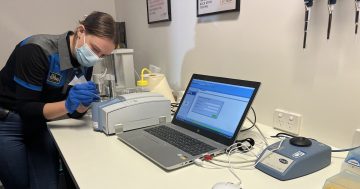
Pharmacists administered upwards of 200,000 COVID-19 vaccines to the community. Photo: Michelle Kroll.
Pharmacists proved themselves pretty handy with a needle during the COVID-19 vaccination push, and now you’ll be able to be protected against even more diseases at your local chemist.
The ACT Pharmacist Vaccination Standards are being amended to allow Canberrans, depending on their age, to receive advice and vaccines for hepatitis A and B, poliomyelitis, typhoid and herpes zoster (shingles) without a prescription within the month.
Health Minister Rachel Stephen-Smith said it was all about improving the community’s access to healthcare.
“Pharmacists play a key role in our health system, providing access to healthcare support and advice for many members of our community,” she said.
“By enabling pharmacists to administer a greater range of vaccines without prescription, we are improving access to immunisation services and helping to protect the community from preventable diseases.”
ACT pharmacists can already give the seasonal influenza vaccine, the diptheria, tetanus and acellular pertussis (dTpa) vaccine, the measles, mumps and rubella (MMR) vaccine, and COVID-19 vaccines.
The move to expand vaccine services has been welcomed by the Pharmacy Guild of Australia.
“We believe this will ease some pressure on the healthcare system,” ACT branch president Simon Blacker said.
“I’d like to thank the Health Minister for enabling pharmacists in the ACT to be of even greater service and assistance to their patients.”
Pharmacists’ services could be extended further still, with NSW Government agreeing to let the Territory’s pharmacies take part in a NSW-led trial to see how effective pharmacists could be prescribing antibiotics to treat uncomplicated urinary tract infections (UTIs) in women.
Pharmaceutical Society of Australia ACT branch president Olivia Collenette said it would be a step forward for equitable healthcare in the capital.
“Pharmacists are well positioned to play a greater role in primary health care, and with appropriate further training, can make oral contraception and UTI treatments more accessible for all Canberrans,” she said.
ACT Health will liaise with NSW Health, researchers from the University of Newcastle and pharmacy stakeholder bodies in the Territory about the trial, with more information to be provided to local pharmacists about how to take part.
Ms Stephen-Smith said the government would work closely with the pharmacy sector to make sure they had the right training and resources to deliver these services “safely and effectively”.
“Enabling pharmacists to assess and initiate treatment for women with uncomplicated urinary tract infections is expected to help patients access treatment more quickly and reduce pressure on other primary healthcare providers,” she said.
“Participation in this trial will help understand the role of pharmacist prescribing in the context of our health system and ensure alignment across ACT and NSW.”
ACT pharmacies taking part in the trial will have to follow strict protocols and diagnostic criteria to ensure the safe and quality use of antibiotics in the treatment of uncomplicated UTIs, and ensure patients understand when they may need to seek further care.
Women can already receive treatment for uncomplicated UTIs at a nurse-led Walk-in Centre in the ACT.



















